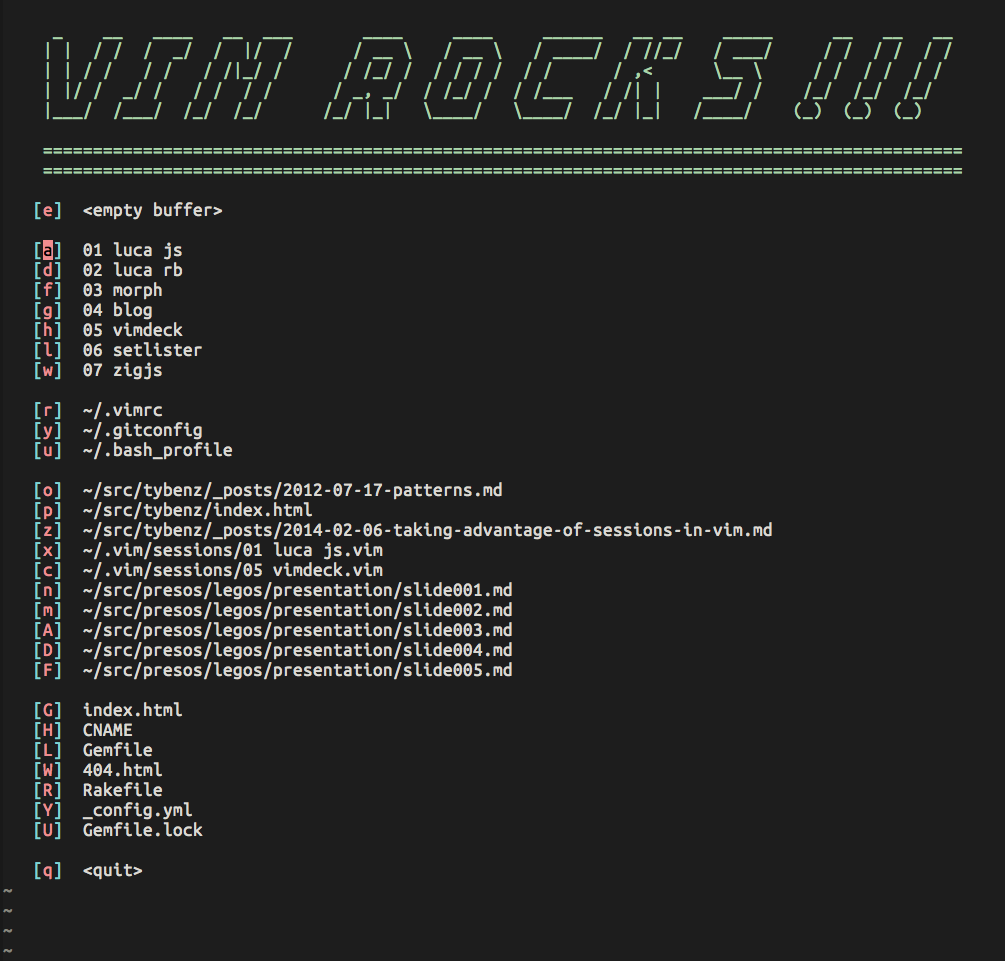Taking advantage of sessions in Vim
A few months ago, on my daily hunt for new, useful Vim plugins, I discovered vim-startify. Startify is a beautiful and organized startup screen for Vim. It provides shortcuts into files from your working directory, a list of bookmarks to files you edit all the time, and your most-recently edited files. As I was going over its docs, I also discovered that it can list out Vim sessions. I’d never read about sessions before. So I began googling.
Vim provides some commands that let you store sessions based on the current
state of Vim. You can load in previously created sessions with source (just
like any other Vim script). The mksession command, out-of-the-box, stores every
little detail about your current session — plugins, scripts, which buffers are
loaded, what your tabs and windows are doing. Because of this, a mksession
file can be really large and really ugly. I actually found that most of the
things mksession was saving to be a bit redundant. For the most part, the
scripts I want executed when I launch Vim are all present in my .vimrc. So I
took the bits that I needed and starting creating my own session files by hand.
The only commands I really need in a project-specific session have to do with changing Vim’s working directory, opening files into buffers, and choosing which of those buffers to edit (I usually start with two files in vertical split panes).
Here’s one of my session files (vimdeck.vim):
cd ~/src/vimdeck
args lib/* lib/templates/* bin/vimdeck Rakefile Gemfile README.md slides.md
edit slides.md
vertical sb lib/vimdeck.rbI change the working directory to the project folder, open files into buffers, then I choose which two files I want to start with (in the above case slides.md and lib/vimdeck.rb). And I can execute all of this by typing:
:source ~/.vim/sessions/vimdeck.vim
Now sessions get even cooler when you pair sessions with Startify. Startify
will list all session files from a directory and provide keyboard shortcuts to
execute them. I put my session files into ~/.vim/sessions and tell startify
where they’re located with:
let g:startify_session_dir = "~/.vim/sessions"
Now everytime I start Vim, I’m greeted with this:

Note that the first section consists of a list of numbered sessions. Startify
assigns shortcut keys to them so if I want to jump into my Vimdeck session, all
I have to do is open Vim and hit h and it will drop me into the right
directory with all of the files I want to be able to edit for that project.
Startify also provides directory-level session file detection. So it will check Vim’s
working directory for a Session.vim file and write out a shortcut for that
session as well. Useful if you’d like to include your session file in your
projects git repository.
Make sure you grab startify and start playing around with its session support. Also, hit me up on twitter if you have any questions/suggestions.